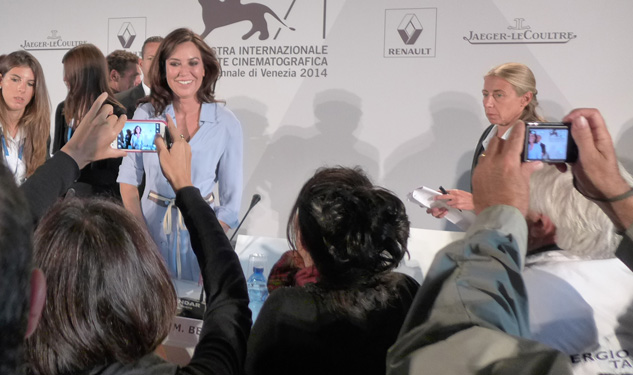
- Industry
Venice Day 8 – Year Of The Mafia
The Mafia cast a long shadow on this year’s Venice Festival, or at least in several Italian films shown here that deal with organized crime syndicates and the very real and corrosive damage they continue to perpetuate on Italian society.
It is now becoming apparent that the effects of the Mafia, on the institutions here, if not by sheer body count, resemble those of the Mexican drug wars, and more and more films are reflecting that realization. The depiction of the Mafia and its descendants is thoroughly devoid of romantic notions for instance in Anime Nere (Black Souls), the third feature by young director Francesco Munzi that opens in Amsterdam where a band of menacing hoods has arrived to business with a Mexican Cartel boss. There is no doubt this is the Mob but at the same time these gangsters are different from the classic Hollywood fodder, nor do they resemble the “meta”, Sopranos version, although David Chase was seen trolling the Excelsior beachfront (he’s here a juror).
The gang in Anime belongs to the ‘Ndragheta the Calabrian branch of the Mafia, lesser known but at the same time more dangerous than its Sicilian (Cosa Nostra<.i>) and Neapolitan (Camorra) counterparts in the triad of Southern Italian crime. Based in the region at the tip of the country’s “toe” the ‘Ndrangheta has the same origins in rural outlaw culture of the mountainous backcountry, but in recent years has expanded its operations into Northern Europe and controls a global drug smuggling network with the ruthlessness of its South American counterparts. Munzi, however, is more interested in the internal dynamics of the clan headed by three brothers, a brutal enforcer, a slick business manager that has relocated to Milan taking the guise (and the wife) of a legitimate businessman and one who has stayed behind in the ancestral hills, so remote and foreign to “modern” Italy that the Calabrian dialogues here are subtitled in Italian. In this tautly told tale their fate comes to resemble an epic tragedy that will eventually consume them, but beyond the all-to realistic violence, what is truly chilling in the film is the realism with which it depicts the way ‘Ndrangheta has been able to transcend its regional origins and infiltrate modern Italian society.
It’s a theme that has recurred of late in Italian films like those of Matteo Garrone, author of the Golden Globe nominated Gomorra on the Neapolitan mob (a Sky TV series of the same name has incidentally been the country’s biggest hit of the year). Beyond the obvious fact that mob stories are naturally compelling narratives, there is little doubt that films about the Mafia here are also an attempt to confront one of the country’s open secrets whose weight can be hard to gage from the outside.
By some estimates organized crime controls a hidden economy as large as a third of the country’s GDP, a criminal metastasis whose ultimate effect is the corrosion of democratic institutions through a culture of impunity and pervasive political corruption. This is also the subject of Belluscone, a mockumentary by Sicilian director Carlo Maresco, who turns his wry lens on a collection of actual small-time mafia operators and sympathizers in a blue collar Palermo neighborhood.
But the case is most forcefully made by Sabina Guzzanti in one of the most incisive and controversial films of the festival: La Trattativa (The Negotiation) . Guzzanti is no stranger to hot-button issues; as a TV comedian she openly clashed with former Prime Minister Silvio Berlusconi whom she mercilessly satirized until she was effectively banned from television. A political comedienne in the style of John Stewart, she has authored a number of hard-hitting films on Italian politics that focus on the misdeeds of the ruling politicians one of which, Viva Zapatero was shown at Sundance, and she has been a student of agit-prop documentary styles in the mold of Michael Moore.
This film is a “mixed-media” documentary narrative that recalls the work of pioneers like Elio Petri and Franco Rosi. With the aid of a troupe of theater actors, Guzzanti “re-enacts” the events that over the last three decades saw the Italian state locked in battle with Cosa Nostra. But it is now all but certain that while ostensibly conducting police operations against it, successive governments, in fact, secretly negotiated and struck deals with heads of the Mafia in Sicily, who demanded and obtained a stake in public works throughout the country while conducting a campaign of terror against DAs and civilians.
The alleged complicity has been largely reported and trials are still ongoing, but Guzzanti successfully weaves a coherent narrative that from the seventies leads to the present day, formulating and substantiating charges – and naming names of past and current politicians, including sitting Italian president Antonio Napolitano and, of course, Silvio Berlusconi – in a way that has seldom been done. And which could very possible make it the most controversial Italian film of the year.
Luca Celada

